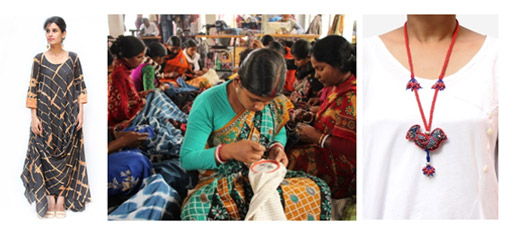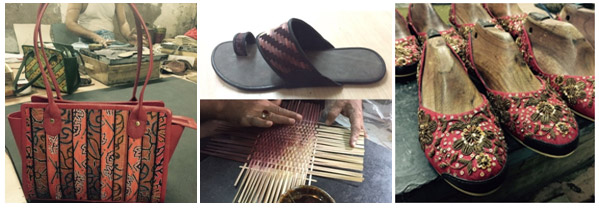June 15, 2017
Responsible Brands working with Artisans directly for Holistic Development
The buzz-word today is ‘handcrafted’, be it for the government agenda of ‘Make in India’ to pop-up stores mushrooming in the cloud. The country is looking inside for inspiration. We are finally taking pride in our crafted treasures and flaunting them as well. Today’s woken-up-at-last consumers are responsible buyers, who consciously opt for indigenous products that are environment-friendly. Several Indian brands are enchasing on basis of this and offering an array of ‘all-things-natural’ merchandise. Fabindia established in 1960, by John Bissell, is perhaps the first Indian retail chain to use the traditional slow processes to develop its product line, initially for exports, and later in 1976 for domestic retail. In 2014, Fabindia launched its western wear brand ‘Fables’, for the contemporary global youth.
To reach the growing youth of the Indian retail segment, Jaypore, iTokri, Tjori, Kraftly, Gaatha, Amrapali and India roots are offering hand crafted products online. The modus operandi for these websites is to source from smaller local brands that in turn source from homegrown craft hubs. While these business models offer the happy consumer – a signature style at a certain price, it supports the artisans as well. On a critical probe, the major share of the profit goes to anyone but the artisans. To do away with this lack, some NGOs and Co-operatives or Societies have recently adopted a new pattern. They directly link with the artisans and are looking at holistically uplifting the slow processes, while safeguarding the hands that craft them. They not only empower artisans but include training, basic education and health facilities for their family.

Deshaj works directly with artisans and train them as well
Deshaj, was born in 2015 to empower the beneficiaries of AIM, an NGO. AIM was established in 2003 and benefited 1200 rural women from the scheduled caste and tribes. They train the novice beneficiaries in several craft processes like Kantha, Shibori, Batik etc. The merchandise produced during the training is sold through Deshaj. Sonali Chakraborty, their Secretary, elaborates, “At Moram, we have created a craft hub. It has a workshop where trainees come and help in producing a range of dresses, tops, palazzos, skirts, jackets and sarees. The beneficiaries are also engaged in supporting our small resort, which is a part of the project.” Here, one can relax over the weekend and enjoy authentic Bengali cuisine made by the artisans and buy exclusive handmade clothes and jewellery from the in-house store. One can buy their products online from www.deshajindia.com. Their presence is noticeable at exhibitions like Kala Ghora, Pause for a Cause and Surajkund Mela. They are shortly opening a store in Kolkata. The proceeds from the profit are used to improve the lifestyle of the artisans. A school is being made to support their children and give them formal education in art. The uniqueness of this brand is the direct involvement of contributors with the business and trying to work towards giving them a better life.

Products made by Raja Gope make clever use of crafts
In his own humble way, Raja Gope is working closely with a few artisans from West Bengal and Odhisa. His brand under his own name has clientele from a few private boutiques in Britain and the British Museum. Raj has started supplying to domestic clients online, through Jaypore. The brand produces exclusively made shoes and bags, which combine leather with Kantha or ShitalPati (woven mats). It also makes batik scarves ensuring very contemporary European aesthetics. Raj follows a unique business model where part of the production is undertaken at the craft clusters but the products are finished under his supervision at his own unit. This ensures quality as per international standards. The designer believes in designing smart pieces that make clever use of the craft. He designs products such that more pieces can be produced quickly thus allowing artisans to earn more in lesser time. He personally visits the artisans and has a great rapport with them. His involvement is not from the head but from the heart and that is what makes him stand apart.
Nomadic, supported by the National Geographic is sourcing globally and supporting artisans by providing them with micro-loans. Their local agents make sure products are of the highest quality. Once the products are sold, the artisans repay to get another new loan. These new-age responsible brands are looking at the bigger picture and are not restricting themselves to old-fashioned profit-making methods. It is certain that there is a paradigm shift towards making a profit that supports the entire supply chain. It is time to give back, to the artisans and to the environment.

